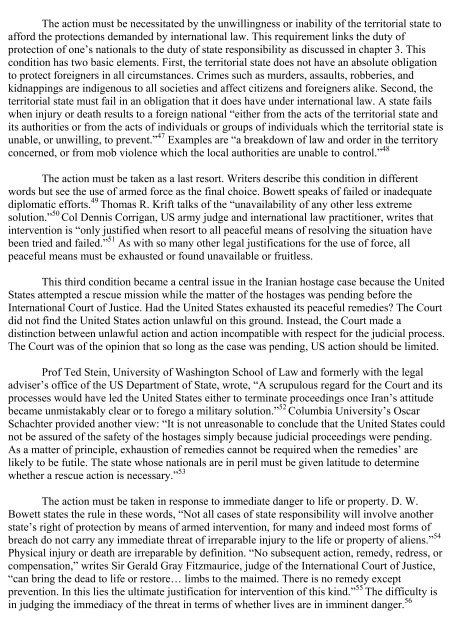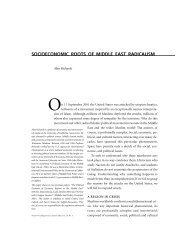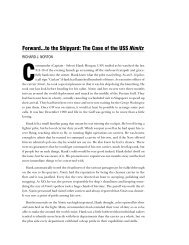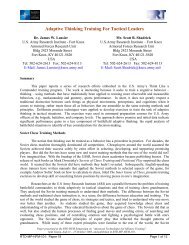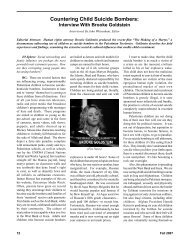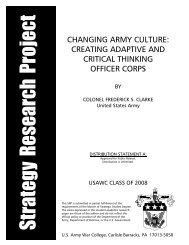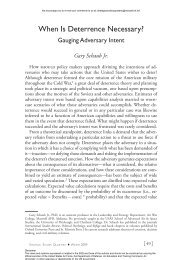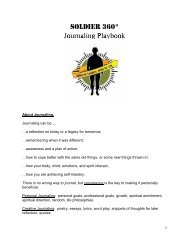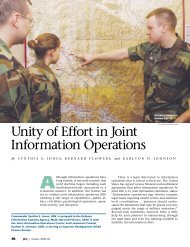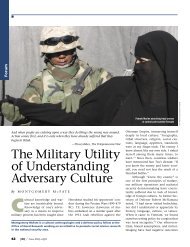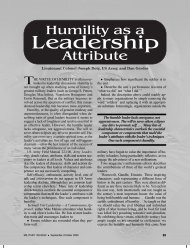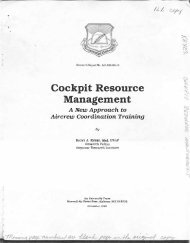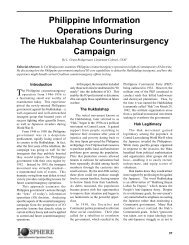Legitimate use of military force against state-sponsored - Air University
Legitimate use of military force against state-sponsored - Air University
Legitimate use of military force against state-sponsored - Air University
Create successful ePaper yourself
Turn your PDF publications into a flip-book with our unique Google optimized e-Paper software.
The action must be necessitated by the unwillingness or inability <strong>of</strong> the territorial <strong>state</strong> to<br />
afford the protections demanded by international law. This requirement links the duty <strong>of</strong><br />
protection <strong>of</strong> one’s nationals to the duty <strong>of</strong> <strong>state</strong> responsibility as discussed in chapter 3. This<br />
condition has two basic elements. First, the territorial <strong>state</strong> does not have an absolute obligation<br />
to protect foreigners in all circumstances. Crimes such as murders, assaults, robberies, and<br />
kidnappings are indigenous to all societies and affect citizens and foreigners alike. Second, the<br />
territorial <strong>state</strong> must fail in an obligation that it does have under international law. A <strong>state</strong> fails<br />
when injury or death results to a foreign national “either from the acts <strong>of</strong> the territorial <strong>state</strong> and<br />
its authorities or from the acts <strong>of</strong> individuals or groups <strong>of</strong> individuals which the territorial <strong>state</strong> is<br />
unable, or unwilling, to prevent.” 47 Examples are “a breakdown <strong>of</strong> law and order in the territory<br />
concerned, or from mob violence which the local authorities are unable to control.” 48<br />
The action must be taken as a last resort. Writers describe this condition in different<br />
words but see the <strong>use</strong> <strong>of</strong> armed <strong>force</strong> as the final choice. Bowett speaks <strong>of</strong> failed or inadequate<br />
diplomatic efforts. 49 Thomas R. Krift talks <strong>of</strong> the “unavailability <strong>of</strong> any other less extreme<br />
solution.” 50 Col Dennis Corrigan, US army judge and international law practitioner, writes that<br />
intervention is “only justified when resort to all peaceful means <strong>of</strong> resolving the situation have<br />
been tried and failed.” 51 As with so many other legal justifications for the <strong>use</strong> <strong>of</strong> <strong>force</strong>, all<br />
peaceful means must be exhausted or found unavailable or fruitless.<br />
This third condition became a central issue in the Iranian hostage case beca<strong>use</strong> the United<br />
States attempted a rescue mission while the matter <strong>of</strong> the hostages was pending before the<br />
International Court <strong>of</strong> Justice. Had the United States exhausted its peaceful remedies? The Court<br />
did not find the United States action unlawful on this ground. Instead, the Court made a<br />
distinction between unlawful action and action incompatible with respect for the judicial process.<br />
The Court was <strong>of</strong> the opinion that so long as the case was pending, US action should be limited.<br />
Pr<strong>of</strong> Ted Stein, <strong>University</strong> <strong>of</strong> Washington School <strong>of</strong> Law and formerly with the legal<br />
adviser’s <strong>of</strong>fice <strong>of</strong> the US Department <strong>of</strong> State, wrote, “A scrupulous regard for the Court and its<br />
processes would have led the United States either to terminate proceedings once Iran’s attitude<br />
became unmistakably clear or to forego a <strong>military</strong> solution.” 52 Columbia <strong>University</strong>’s Oscar<br />
Schachter provided another view: “It is not unreasonable to conclude that the United States could<br />
not be assured <strong>of</strong> the safety <strong>of</strong> the hostages simply beca<strong>use</strong> judicial proceedings were pending.<br />
As a matter <strong>of</strong> principle, exhaustion <strong>of</strong> remedies cannot be required when the remedies’ are<br />
likely to be futile. The <strong>state</strong> whose nationals are in peril must be given latitude to determine<br />
whether a rescue action is necessary.” 53<br />
The action must be taken in response to immediate danger to life or property. D. W.<br />
Bowett <strong>state</strong>s the rule in these words, “Not all cases <strong>of</strong> <strong>state</strong> responsibility will involve another<br />
<strong>state</strong>’s right <strong>of</strong> protection by means <strong>of</strong> armed intervention, for many and indeed most forms <strong>of</strong><br />
breach do not carry any immediate threat <strong>of</strong> irreparable injury to the life or property <strong>of</strong> aliens.” 54<br />
Physical injury or death are irreparable by definition. “No subsequent action, remedy, redress, or<br />
compensation,” writes Sir Gerald Gray Fitzmaurice, judge <strong>of</strong> the International Court <strong>of</strong> Justice,<br />
“can bring the dead to life or restore… limbs to the maimed. There is no remedy except<br />
prevention. In this lies the ultimate justification for intervention <strong>of</strong> this kind.” 55 The difficulty is<br />
in judging the immediacy <strong>of</strong> the threat in terms <strong>of</strong> whether lives are in imminent danger. 56


